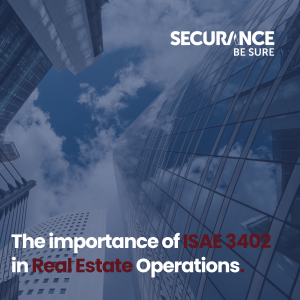In the complex realm of real estate, where precision in transactional integrity and the assurance of operational controls are paramount, ISAE 3402 emerges as a pivotal standard. This framework is not merely about meeting compliance requirements but is a decisive tool for real estate companies aiming to showcase their commitment to robust governance and transparent financial practices. By integrating ISAE 3402, firms not only adhere to international norms but also strategically position themselves to enhance investor confidence and stakeholder trust in an increasingly scrutinized market environment.
Exploring ISAE 3402: A deep dive into its significance
ISAE 3402, the International Standard on Assurance Engagements, serves as a critical tool for service organizations to demonstrate robust internal controls over their operations, particularly those related to financial reporting. For real estate businesses, which are inherently complex due to their significant transaction values and regulatory scrutiny, ISAE 3402 provides a structured approach to documenting and validating the controls in place, thus enhancing the reliability of the information provided to investors and stakeholders.
The role of ISAE 3402 in robust Risk Management practices
Effective risk management is vital in real estate, where the stakes are inherently high. Adopting ISAE 3402 helps companies establish a clear and accountable method for managing operational risks, offering reassurance to investors and clients about the integrity of the firm’s processes. For instance, real estate companies like Spring Real Estate have successfully leveraged ISAE 3402 to professionalize their internal procedures, ensuring that property valuations are conducted at the highest standards.
Operational benefits of implementing ISAE 3402
Implementing ISAE 3402 offers substantial operational benefits that extend beyond compliance, fundamentally enhancing the efficiency and reliability of real estate companies’ internal systems. This standard compels organizations to critically assess and document their control processes, which can lead to significant improvements in how these systems operate daily.
Firstly, the structured approach required by ISAE 3402 encourages organizations to establish well-defined procedures for managing both routine and exceptional transactions. This clarity and standardization of processes reduce the likelihood of errors and inefficiencies, streamlining operations and potentially reducing operational costs. By mandating regular reviews and audits of these controls, ISAE 3402 also ensures that these processes remain effective and are continuously improved over time, aligning with best practices and evolving industry standards.
Secondly, ISAE 3402 facilitates greater transparency within the organization. It requires that the details of control activities be clearly documented and readily available for audit. This transparency is crucial not only for internal assessments but also enhances the credibility of the organization with external stakeholders, including regulators, investors, and partners. By demonstrating a commitment to rigorous governance through ISAE 3402 compliance, companies can build trust and strengthen their reputation in the market.
Furthermore, the risk management aspect of ISAE 3402 cannot be overstated. By identifying and addressing potential risks in operations and financial reporting, companies can avoid significant pitfalls that might otherwise impact their financial health and operational stability. This proactive risk assessment helps safeguard the company from potential financial discrepancies and operational disruptions, which in turn supports sustainable business growth.
Moreover, the implementation of ISAE 3402 often leads to a cultural shift within the organization towards greater control consciousness among employees. When staff members are aware that processes are regularly reviewed and audited, it fosters a culture of accountability and precision. This cultural shift is beneficial not just for compliance purposes but also enhances the overall operational discipline of the organization, leading to better decision-making and increased organizational agility.
ISAE 3402 as a catalyst for market differentation and growth
ISAE 3402 provides real estate companies with a powerful framework for highlighting their adherence to rigorous governance and operational excellence, which is crucial for differentiation in a competitive market. This compliance reassures investors and clients about the company’s commitment to maintaining high standards in process management and risk control. By meeting the ISAE 3402 standards, firms not only enhance their credibility but also improve operational workflows, which can lead to increased efficiency and reduced overhead costs. Furthermore, the requirement for regular audits under ISAE 3402 promotes a culture of continuous improvement within firms, ensuring that their processes remain aligned with best practices and adapt to new regulatory demands. This proactive stance on transparency and accountability makes a real estate company more attractive to potential partners and investors, solidifying its reputation as a trustworthy and forward-thinking market leader.

ISAE 3402 stands as a pivotal standard within the real estate sector, crucial for ensuring transactional integrity and establishing robust operational controls.
Future directions: Adapting ISAE 3402 to emerging market needs
As technology continues to reshape the landscape of real estate, ISAE 3402 is poised for necessary adaptations to address the challenges of digital transformation. The standard is expected to increasingly focus on IT risks, cybersecurity measures, and data protection to ensure that real estate companies can effectively manage and safeguard sensitive information in a digital-first world. This shift is crucial as the reliance on digital platforms and data analytics grows, demanding robust security and privacy controls to maintain stakeholder trust and comply with stringent data regulations.
Furthermore, as environmental, social, and governance (ESG) factors become more integral to business operations and investor decision-making, ISAE 3402 may expand to include these aspects. Aligning the standard with ESG considerations will not only meet the growing demands for sustainability and ethical governance but also enhance transparency and accountability in these critical areas. Such developments will necessitate ongoing updates to internal practices and processes among real estate firms, ensuring they remain compliant and continue to lead in governance and risk management amidst evolving market expectations.
Conclusion: The enduring relevance of ISAE 3402 in Real Estate
ISAE 3402 stands as a pivotal standard within the real estate sector, crucial for ensuring transactional integrity and establishing robust operational controls. This framework transcends mere regulatory compliance, serving as an indispensable tool for real estate companies striving to demonstrate their dedication to sound governance and transparent financial practices. By implementing ISAE 3402, firms not only align with international norms but also strategically enhance their position to boost investor confidence and trust in a highly scrutinized market.
The significance of ISAE 3402 extends through every layer of a real estate organization, from streamlining operations to fortifying risk management frameworks. It enforces a discipline of continuous improvement and accountability, leading to operational enhancements that reduce inefficiencies and safeguard the firm’s financial health. Moreover, the standard’s evolving nature—especially its potential expansion to cover IT risks and ESG factors—suggests its growing alignment with contemporary business practices and stakeholder expectations. As real estate companies navigate the complexities of a digital and environmentally conscious market, ISAE 3402 provides a clear pathway to maintaining competitive advantage and upholding a reputation for excellence and reliability in an ever-evolving industry landscape

